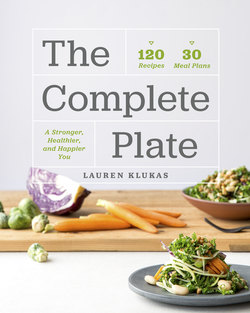Читать книгу The Complete Plate - Lauren Klukas - Страница 18
На сайте Литреса книга снята с продажи.
Оглавление18
Carbohydrates are the primary fuel source for our body, in particular for our brain, and provide fiber and multiple vitamins and minerals.6 A healthy diet should get 45–65 percent of its calories from complex carbohydrates,7 not refined (highly processed) carbohydrates and free sugars (see next paragraph). Whole grains, starchy vegetables, and legumes are considered complex carbohydrates, meaning they are high in fiber and require more work for our body to digest, helping us feel fuller for longer and stabilizing blood sugar and cholesterol levels. Refined carbohydrates are grains that have been processed (think of turning grain kernels into flour) and have had most of the fiber removed. Examples include white flour and white pasta. These foods are digested faster by our body, which impacts our hunger, blood sugar, and heart health. If you enjoy refined carbohydrates, try to make a shift to include them as treats, not as a staple part of your diet.
Sugars that are found in whole fruit and dairy products are also part of a healthy diet in moderation, as these foods are nutrient dense. Free sugars, on the other hand, are found in treat foods such as candy, cakes, sweetened yogurt, and ice cream, as well as in sugar-sweetened beverages (think pop), honey, syrup, and fruit juice. Yes, even 100 percent fruit juice! Limiting free sugars is beneficial for our overall health and helps with weight management and in reducing the risk for associated chronic diseases.8
Protein is the key building block of all structures in our body, including organs, muscles, and skin, as well as things we cannot see like enzymes and hormones. It is recommended that protein account for 10–35 percent of our caloric intake or 0.8–1.0 grams of protein for every kilogram of body weight (you will also need more protein if you are very active or have certain medical conditions).9
Typically, when we think of protein, we think of animal products such as meat and poultry, eggs, and dairy products. These protein sources are complete proteins, meaning they contain all of the amino acids (protein components) that our bodies need but cannot make, and therefore must get from food. It is possible to get too much protein, although this is often achieved through supplemental protein intake rather than diet alone. Excess protein intake leads to protein being stored as fat and puts extra stress on the kidneys.
Grains, nuts and seeds, and legumes also contribute protein to our diet. But since plants (except quinoa and soy) are missing some of the amino acids our body needs, eating a variety of plant-based foods is important. Adding more plant sources of protein also helps cut back on the fats we get from animal products and increase our fiber intake, which improves overall health. Really, it is all about variety and moderation.
Fat also has important roles in our body, including insulation, protecting
